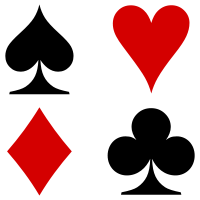|
تضامنًا مع حق الشعب الفلسطيني |
رموز أوراق اللعب

في ورق اللعب، يوجد أربعة رموز شائعة ومعروفة. وتختلف مهام هذه الأنواع بحسب اللعبة. وتشمل ورق اللعب يوجد عدد لا يحصى من ألعاب الورق ، بما في ذلك عائلات الألعاب ذات الصلة (مثل البوكر). هناك عدد صغير من ألعاب الورق التي يتم لعبها بالطرق التقليدية التي تم توحيدها رسميًا مع البطولات الدولية التي تقام ، ولكن معظمها عبارة عن ألعاب شعبية تختلف قواعدها حسب المنطقة والثقافة والشخص. أيضاً نوع آخر من الرموز وهو الجوكر. وتشمل الرموز على أربعة أنواع؛ وهي الهاص أو الحاس (وتُسمى أيضاً الكبة) والسبيت (وتُسمى أيضاً بستوني) والكلفس (وتُسمى أيضاً شيريا أو سنك) والديمن (وتُسمى أيضاً ديناري). وهذه الرموز تخص الأوراق الفرنسية وتختلف أشكال هذه الرموز وأسمائها بحسب نوعيّة الأوراق. فمثلاً الأوراق الألمانية السويسرية يًستخدم رمز الورقة الصفراء للدلالة على نوع الروزيس. في لعبة الورق الفرنسية يكون الهاص والديمن مُلوّنان باللوّن الأحمر والسبيت والكلفس ملوّنان باللون الأسود. وفي بعض الأوراق الأخرى وعلى خلاف ورقة اللعب الفرنسية يكون كل رمز مُلوّن بلون مُختلف.
الرموز
| رموز أوراق اللعب | ||||
|---|---|---|---|---|
| الورق | الرمز | |||
| الأوراق الفرنسية[1][2][3][4][5] | هاص بالفرنسية: Cœurs (قلوب) |
ديمن بالفرنسية: Carreaux (بلاط) |
كلفس بالفرنسية: Trèfles (برسيم) |
سبيت بالفرنسية: Piques (رِماح) |
| الأوراق الألمانية[6] | Hearts |
Bells |
Acorns |
Leaves |
| الأوراق الألمانية السويسرية[7][8][9][10] | Roses Swiss-German: Rosen |
Bells Swiss-German: Schellen |
Acorns Swiss-German: Eichel |
Shields Swiss-German: Schilten |
| الأوراق الإيطالية والاسبانية (أو اللاتينية) | Cups Italian: Coppe Spanish: Copas |
Coins Italian: Denari Spanish: Oros |
Clubs Italian: Bastoni Spanish: Bastos |
Swords Italian: Spade Spanish: Espadas |
| أوراق التاروت | أكواب | نجمة خماسية | صولجان | سيوف |
المراجع
- ^ Webster's II New College Dictionary: Third Edition. Boston, MA: Houghton Mifflin. 2005. ص. 1082. ISBN:9780618396016.
- ^ The French suits are also an international standard, even in countries with differing traditional suits. In Germany, Turnierbild (tournament-style) decks use four-color French symbols, with yellow Diamonds, green Spades and sometimes brown Clubs, as a compromise between French and German suits.
- ^ Clubs are also known as clovers, flowers and crosses. The French name for the suit is trèfles meaning clovers, the Italian name for the suit is fiori meaning flowers and the German name for the suit is Kreuz meaning cross.
- ^ The shape of the clubs symbol is believed to be an adaptation of the German suit of acorns.
- ^ In the Germanic countries the spade was the symbol associated with the blade of a جاروف. The English term spade originally did not refer to the tool but was derived from the Italian word spada meaning سيف from the Italo-Spanish suit. Those symbols were later changed to resemble the digging tool instead to avoid confusion. In German and Dutch the suit is alternatively named Schippen and schoppen respectively, meaning مجرفةs.
- ^ Popularity of these German suits depends on the region and the game involved; they are generally found only in 32-card decks for Skat or 48-card decks for Doppelkopf; German Bridge decks (with 52 cards) normally use the international/French suits. Skat and Doppelkopf decks are available in four-color French suits as well; see Note 1.
- ^ There does not appear to be a single universal system of correspondences between Swiss-German and French suits. Cards combining the two suit systems are manufactured in different versions with different combinations of suits.
- ^ "App für Android: SwissJass Free" (بالألمانية). netzwelt. Archived from the original on 2016-01-18. Retrieved 2013-05-18.
Das französische Blatt ist unter anderem vom Poker sehr bekannt und beinhaltet die 'Farben' Karo, Herz, Pik und Kreuz. Dem entsprechen die deutschschweizer Farben Schellen, Rosen, Schilten und Eichel.
- ^ "Schweiz" [بطاقات مولر السويسريةd] (بالألمانية). Kartenhaus. Archived from the original on 2019-05-03. Retrieved 2013-05-18.
- ^ "Jass" (بالألمانية). Spielanleitung.com. Archived from the original on 2016-03-03. Retrieved 2013-05-18.
Die Übertragung dieser Farben auf die französische Karte ist von eigener Auslegung











